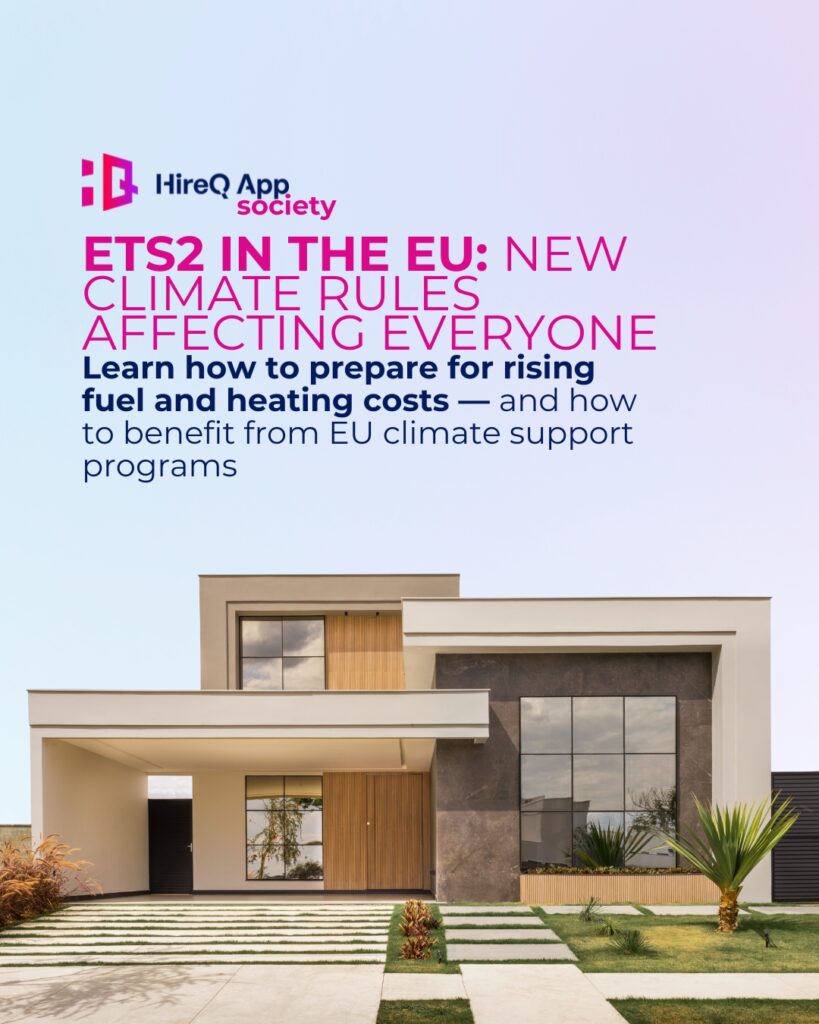
Starting in 2027, the EU will roll out a new emissions trading scheme — ETS2 — that will affect home heating and road fuel.
Although fuel suppliers will formally buy and pay for CO₂ allowances, the extra cost will likely be passed on to consumers — tenants, homeowners, and drivers.
🌍 What Is ETS2 — In Plain English
ETS2 (Emission Trading System 2) is an extension of the EU carbon market that now covers building heating and road transport.
Fuel suppliers will buy CO₂ emission allowances and include this cost in the final prices of gas, oil, and fuel.
The main goal is to reduce emissions and accelerate the transition to energy-efficient, low-carbon solutions.
⛽ What to Expect for Prices
Experts warn that heating and fuel prices will rise in the first years after ETS2 starts, as suppliers will likely transfer allowance costs to consumers.
This may lead to:
Higher energy bills for households 🔥
Increases in per-litre fuel prices at petrol stations 🚗
🕒 ETS2 Implementation Timeline
2024–2026: Preparation phase — reporting, testing, pilot programs
2027: Planned start of ETS2 — suppliers begin purchasing CO₂ quotas
After 2027: Possible delays or phased introduction if energy prices rise too fast
💶 Social Support: The EU Social Climate Fund (SCF)
To help vulnerable households, the EU created the Social Climate Fund (SCF).
Funds will support:
Heating subsidies
Boiler replacement and insulation
Heat pumps and renewable energy
Public transport improvements
These programs aim to ease the transition and protect lower-income families from sudden price increases.
🏡 Example Impact on Household Budgets
Without efficiency upgrades, average households could spend hundreds of euros more per year
Fuel could rise by several groszy (cents) per litre, depending on CO₂ prices and supplier policies
📊 Who Is Hit Hardest — and Who Benefits
Most affected:
Owners of old, poorly insulated homes 🧱
Drivers of petrol or diesel vehicles with high mileage
Small transport companies with heavy fuel use
Less affected / may benefit:
Homes with heat pumps or electric heating
EV drivers and public transport users
Households receiving energy-efficiency grants
🔧 How to Prepare — 5 Practical Steps for People Working in Poland
Check your home’s heating system
If you use gas, oil, or coal, expect higher bills and plan ahead.
Apply for state support programs
🇵🇱 Czyste Powietrze — grants for insulation, boiler replacement, window upgrades
🇵🇱 Moje Ciepło — support for installing heat pumps and efficient heating systems
Improve insulation and efficiency
Seal windows, insulate doors, use thermostats — even small changes reduce costs.
Reconsider transport choices
If fuel prices rise, consider hybrids, EVs, or public transport depending on your commute and budget.
Monitor your consumption
Use energy meters or smart thermostats to track and control your usage.
🧭 Practical Advice for People Who Moved to Poland for Work
✅ Talk to your employer or landlord
Ask what heating system is used and whether modernization plans exist.
✅ Use national support programs
Czyste Powietrze — insulation, old boiler replacement, window improvements
Moje Ciepło — financial help for heat pumps and modern systems
✅ Take small efficiency steps now
Simple fixes like sealing windows or adjusting thermostats can quickly pay off.
✅ Install a meter and track usage
Awareness is the first step to saving money.
✅ Plan transport costs realistically
When buying a car, consider potential increases in petrol or diesel prices.
❓ FAQ — Quick Answers
Will ETS2 replace fuel excise taxes?
No — ETS2 adds a CO₂ cost on top of existing taxes.
Does ETS2 affect LPG?
Yes, if LPG is used for heating or as vehicle fuel.
Are compensations automatic?
No — you need to apply through national or local programs.
💡 Bottom Line
ETS2 is a confirmed EU climate mechanism designed to reduce emissions by pricing CO₂ from heating and transport fuels.
While it may raise costs initially, smart preparation — insulation, energy efficiency, and using state programs — can protect your budget and support a cleaner future. 🌱
Share if you found this post useful!


